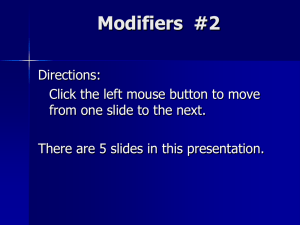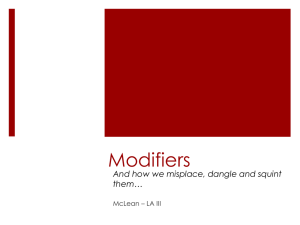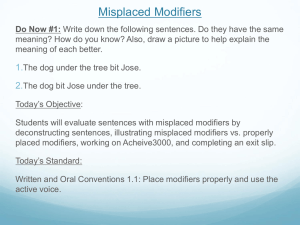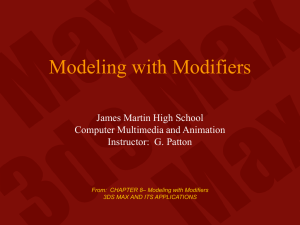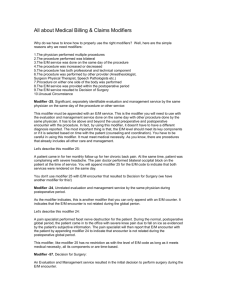Correcting Misused Modifiers
advertisement
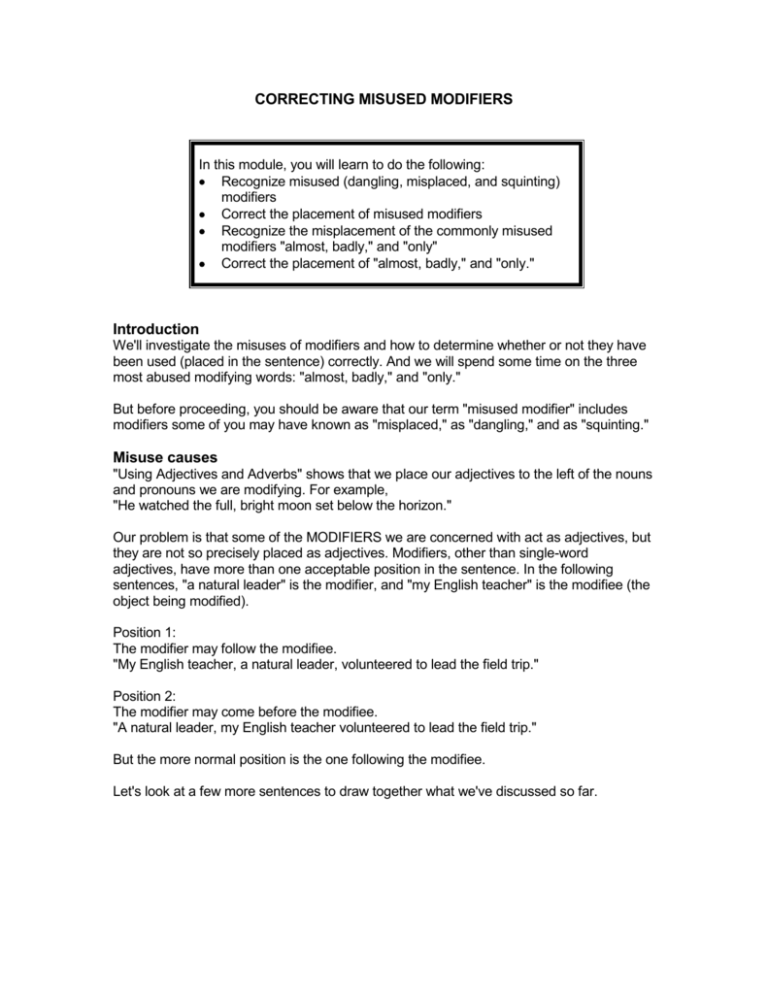
CORRECTING MISUSED MODIFIERS In this module, you will learn to do the following: Recognize misused (dangling, misplaced, and squinting) modifiers Correct the placement of misused modifiers Recognize the misplacement of the commonly misused modifiers "almost, badly," and "only" Correct the placement of "almost, badly," and "only." Introduction We'll investigate the misuses of modifiers and how to determine whether or not they have been used (placed in the sentence) correctly. And we will spend some time on the three most abused modifying words: "almost, badly," and "only." But before proceeding, you should be aware that our term "misused modifier" includes modifiers some of you may have known as "misplaced," as "dangling," and as "squinting." Misuse causes "Using Adjectives and Adverbs" shows that we place our adjectives to the left of the nouns and pronouns we are modifying. For example, "He watched the full, bright moon set below the horizon." Our problem is that some of the MODIFIERS we are concerned with act as adjectives, but they are not so precisely placed as adjectives. Modifiers, other than single-word adjectives, have more than one acceptable position in the sentence. In the following sentences, "a natural leader" is the modifier, and "my English teacher" is the modifiee (the object being modified). Position 1: The modifier may follow the modifiee. "My English teacher, a natural leader, volunteered to lead the field trip." Position 2: The modifier may come before the modifiee. "A natural leader, my English teacher volunteered to lead the field trip." But the more normal position is the one following the modifiee. Let's look at a few more sentences to draw together what we've discussed so far. Sentence: "The car raced to the first turn accelerating rapidly." The modifier "accelerating rapidly" comes after the noun turn. By not being positioned in one of the two acceptable positions beside the intended modifiee (The car), "accelerating rapidly" modifies the first turn. To say that the first turn was accelerating rapidly is nonsense created by an obviously misused modifier. Sentence: "Listening attentively, the mayor addressed the workers." The modifier "listening attentively" is in the second acceptable position, to the left of a possible modifiee, the mayor. So the modifier modifies the mayor. To say that the mayor was listening attentively while he addressed the workers is to describe a physical impossibility created by another obviously misused modifier. What we'll do next is examine two faulty sentences. At the same time, we'll correct the flaws and develop a procedure to use in correcting misused modifiers. Procedure The procedure involves the four following steps: 1. Identifying the modifier 2. Identifying the modifiee 3. Analyzing the modification 4. Repositioning the modifier. Sentence: "Drifting behind a cloud, we watched the full harvest moon disappear." The modifier "drifting behind a cloud" does not come after any word, so the modifier modifies the word to the right. The modifier searches to the right and finds the pronoun we. Is it true that we were drifting behind a cloud? 1. Identify the modifier. We identify Drifting behind a cloud. 2. Identify the modifiee. We identify "we." 3. Analyze the modification. Combine the modifiee with the modifier. Do I really want to modify we with drifting behind a cloud? If the answer is yes, STOP, your modifier is not misused. If the answer is NO, continue with the procedure. Our answer is NO. 4. Reposition the modifier. Ask: "What do I want to modify with Drifting behind a cloud"? Answer: moon is the true modifiee. Place the modifier after the true modifiee. "We watched the full harvest moon, drifting behind a cloud, disappear." The misused modifier is now correctly repositioned. One other position is acceptable. "We watched the full harvest moon disappear, drifting behind a cloud." Practice Now let's streamline the procedure and try some rapid-fire sentences. If you experience problems, refer to the complete procedure. In the practice sentences, identify the misused modifier (MM). Then determine after which word (in the sentence) you would place the MM to correct the misplacement. Sentence: "Suddenly becoming sleepy, the bed looked inviting to Andrew." Modifier: Suddenly becoming sleepy. Modifiee: Bed. Analysis: Wrong modification. Andrew is true modifiee. Repositioning: After Andrew. "The bed looked inviting to Andrew, suddenly becoming sleepy." The misused modifier has been correctly repositioned. Sentence: "Personal: Would like to meet divorced gentleman for long-term relationship with moderate habits." Modifier: With moderate habits. Modifiee: Relationship. Analysis: Wrong modification. Gentleman is true modifiee. Repositioning: After gentleman. "Personal: Would like to meet divorced gentleman with moderate habits for long-term relationship." Three Little Words Three modifiers tend to be regularly misused by writers. The three words "almost, badly," and "only," if misused, can lead to confused writing. Look at the following sentences. "Henry almost earned a hundred dollars last weekend." Did Henry earn any money at all? OR Did Henry earn $99? "Henry wants to learn to speak French badly." Does Henry desperately want to speak French? OR Does Henry want to speak French in a poor manner? "Henry only has a dollar left." Does Henry have one dollar left? OR Does Henry have some money while his friends have none? Do you see the confusion that can arise from the misuse of those three modifiers? We can avoid this confusion by following two simple rules. Rule 1 Place the modifiers "almost" and "only" immediately before the words they modify. Examples: "Henry earned almost a hundred dollars last weekend." "Henry has only a dollar left." Rule 2 Place the modifier "badly" immediately before the main verb it modifies. Examples: "Henry badly wants to learn to speak French." "Henry had badly wanted to learn to speak French before he left on vacation." Exercises Select the sentence that corrects the misplaced modifier found in the question sentence. The answers appear after the last question. 1. The ambulance took the victim to a hospital with a broken leg. A. The ambulance with a broken leg took the victim to a hospital. B. With a broken leg, the ambulance took the victim to a hospital. C. The ambulance took the victim with a broken leg to a hospital. 2. Arrun wanted to learn to speak Arabic badly. A. Badly, Arrun wanted to learn to speak Arabic. B. Arrun wanted to learn badly to speak Arabic. C. Arrun badly wanted to learn to speak Arabic. 3. Susan worked long hours to put herself through college as a sales clerk. A. Susan worked long hours as a sales clerk to put herself through college. B. Susan worked long hours to put herself, as a sales clerk, through college. 4. She almost made $60 last weekend. A. She made $60 almost last weekend. B. She made almost $60 last weekend. 5. Being unfamiliar with accounting, the trial balance was very difficult for Fred. A. The trial balance was very difficult for Fred, being unfamiliar with accounting. B. The trial balance, being unfamiliar with accounting, was very difficult for Fred. C. The trial balance was very difficult, being unfamiliar with accounting, for Fred. 6. For sale: A vintage car by a retired farmer needing some minor repairs. A. For sale: Needing some minor repairs by a retired farmer, a vintage car. B. For sale: A vintage car needing some minor repairs by a retired farmer. C. For sale: A vintage car by a retired farmer. The car needs some minor repairs. 7. Flying overhead, the hunter shot at a goose. A. The hunter flying overhead shot at a goose. B. The hunter shot at a goose, flying overhead. C. The hunter shot, flying overhead, at a goose. D. The hunter shot at a goose which was flying overhead. 8. The accused was brought before a judge with a guilty look on his face. A. The accused was brought with a guilty look on his face before a judge. B. The accused with a guilty look on his face was brought before a judge. 9. The Dean ordered the student off the campus carrying a gallon of paint. A. Carrying a gallon of paint, the Dean ordered the student off the campus. B. The Dean, carrying a gallon of paint, ordered the student off the campus. C. The Dean ordered the student carrying a gallon of paint off the campus. 10. My father bought me my first car at the age of 16. A. At the age of 16, my father bought me my first car. B. My father, at the age of 16, bought me my first car. C. When he was 16, my father bought me my first car. D. My father bought me my first car when I turned 16. Answers 1, C. 2, C. 3, A or B. 4, B. 5, A. 6, C. 7, D or B. 8, B. 9, C. 10, D.
